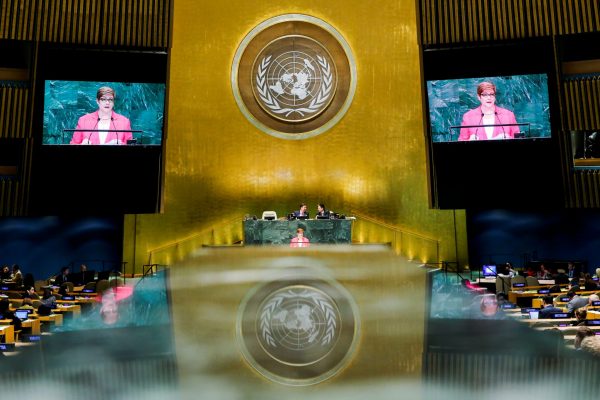The ANZUS treaty is widely believed to be evidence of Australia’s unique friendship with the United States, based not only on the two countries’ close military ties, but also on fundamental cultural values. Few US allies are so ideologically integrated into US security networks as Australia. It is this ideological aspect that underpins Australia’s middle power status in regional and global affairs. While there are certainly side benefits of a relationship of this kind, such as the sharing of intelligence under the Five Eyes agreement, transparency is limited and ANZUS needs to be realistically reappraised.
Australia’s strategic intimacy and cultural affinities with the United States are routinely cited as evidence that the country can rely on its ‘great and powerful friend’ for security. This seems assured when a US president proposes Australia is ‘America’s deputy sheriff’ in the Asia Pacific, or when the current US ambassador declares that Australia should seek a ‘great power’ role in the region. It is also the reason that Australia has participated in all US wars since World War II.
But ANZUS advocates can be too easily misled by the disingenuous rhetoric surrounding the alliance. They tend to overlook the fundamental asymmetry that dogs it. Big power alliances are only ever liaisons of immediate convenience. If the big power decides to limit the effectiveness of the alliance (as Washington has done on occasions with ANZUS) or abandon it altogether, there is nothing that the small ally can do about it. Given US President Donald Trump’s quixotic views about traditional US allies, this fact should be at the top of the agenda for Australia’s foreign policymakers as they ponder developments in East Asia.
What this all means is that Australia’s claims to middle power status need close investigation. Its strong commitment to ANZUS puts it in danger of appearing forever in need of affirming its loyalty to the United States in order to guarantee security. This aspect of the alliance is likely to become more problematic as the Trump administration lurches from one foreign policy crisis to another.
Following the Osaka G20 summit, if Australia is to work effectively within a rules-based order as a genuinely independent middle power, it should be far more cautious about its alliance with the United States. Australian Prime Minister Scott Morrison’s call to end damaging trade wars was a valued contribution to the Osaka meeting. But was it listened to by President Trump? If Australia wants to pursue a more equal relationship with the United States, it has to be better prepared to explain that while Australia aligns with the interests of the United States on some occasions, on others it does not.
How can Australia develop a robust and respected middle power role for itself in the region and globally?
As Hugh White has shown, the first step toward this goal is to increase its defence budget. The time has come to relinquish its over-reliance on US military power. But it will require more than increasing the defence budget if Australia is to achieve middle power influence as a good global citizen.
There are models for Australia to learn from. Norway and Sweden for example are both states with diplomatic influence in East Asia. Norway’s role in pressuring the military junta in Myanmar to take early steps toward democratisation was impressive. And Australia had to solicit the assistance of Sweden’s envoy to facilitate the release of the young Australian Alek Sigley from detention in North Korea this year.
Improving Australia’s diplomacy will require a major expansion of the country’s diplomatic service — both of numbers of personnel and improvements in the kinds of expertise needed in a twenty-first century diplomatic corps. For too long now the Department of Foreign Affairs and Trade has been seriously under-resourced. Many more Australian diplomats are needed with a sound grounding in the complexities of globalisation and the contemporary developments of international relations. Their primary task will be to identify opportunities for niche diplomacy that will enhance Australia’s international standing as a genuine independent middle power that can contribute to the making of a peaceful world.
There are also lessons to be learned by Australia from the Non-Aligned Movement that emerged during the early stages of the Cold War. That movement sought to bring together states that had thrown off the shackles of colonialism while avoiding being trapped into joining the games played by the then emerging superpowers, the United States and the Soviet Union.
Australia and like-minded states have much to gain if they come together to further their shared interests across a wide range of matters — the destructive machinations of big powers, nuclear weapons proliferation, climate change, terrorism, refugees and human rights abuses. Australia should become part of a concert of middle powers, a regional and global grouping that through united efforts could ameliorate the dangerous games being played by great powers.
The time has come for an Australia that stands on its own feet, militarily and diplomatically.
Allan Patience is Principal Fellow at the School of Social and Political Sciences, the University of Melbourne. He is the author of Australian Foreign Policy in Asia: Middle Power or Awkward Partner? (Palgrave Macmillan, 2018).

